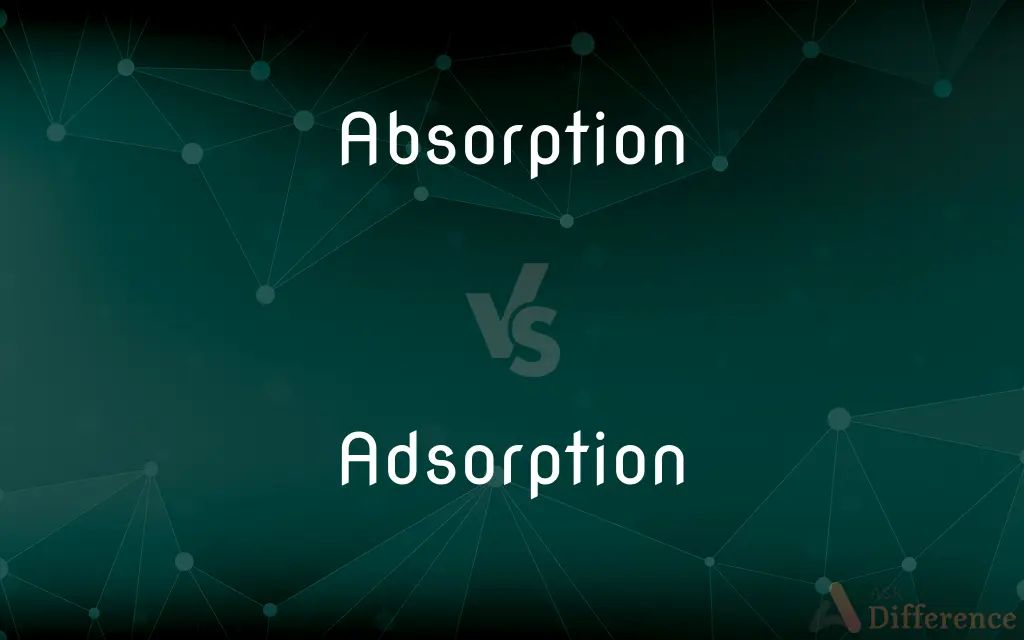Absorption vs. Adsorption — What's the Difference?
By Tayyaba Rehman — Updated on October 5, 2023
Absorption is when one substance is taken in and evenly distributed throughout another (e.g., a sponge soaking up water). Adsorption is the adherence of molecules to the surface of another substance (e.g., molecules sticking to activated charcoal).

Difference Between Absorption and Adsorption
Table of Contents
ADVERTISEMENT
Key Differences
Absorption and adsorption, while sounding similar, signify different processes in chemistry and physics. Absorption pertains to the process where one substance becomes incorporated throughout another substance, like a sponge absorbing water. It often leads to the full integration of molecules into the volume of the absorbing material.
Contrarily, adsorption refers to the gathering of molecules on the surface of a material, not within its volume. In adsorption, substances adhere to the exterior surfaces or boundaries of another substance. For instance, when activated charcoal is used to purify air or water, it works through the principle of adsorption.
Another way to understand the distinction is to think of absorption as a "bulk" phenomenon. Molecules are taken up by the entire volume of the absorbing material. In contrast, adsorption is a "surface" phenomenon, where molecules cling only to the surface.
Furthermore, the mechanisms driving absorption and adsorption differ. Absorption generally happens because of the chemical or physical properties that lead substances to disperse or dissolve in another. Adsorption, on the other hand, is driven by the surface energy, resulting in molecules accumulating on the surface of the adsorbing material.
Comparison Chart
Definition
Incorporation of a substance into another.
Adhesion of molecules to a surface.
ADVERTISEMENT
Process
Bulk phenomenon.
Surface phenomenon.
Depth
Occurs throughout the volume of the material.
Happens only at the surface of the material.
Mechanism
Driven by chemical or physical properties.
Driven by surface energy.
Example
Sponge absorbing water.
Activated charcoal capturing impurities from water.
Compare with Definitions
Absorption
Conversion of radiant energy into a different form, usually heat.
The Earth's atmosphere plays a crucial role in the absorption of solar radiation.
Adsorption
Capture and hold of substances at the interface between two phases.
Adsorption is commonly used in wastewater treatment to remove pollutants.
Absorption
Assimilation of knowledge or information.
His quick absorption of the training material impressed his peers.
Adsorption
Accumulation of gas, liquid, or solute molecules on a solid or liquid surface.
Certain gases demonstrate more rapid adsorption on metals than others.
Absorption
Incorporation of energy, such as light or sound, without reflection.
Dark colors lead to greater absorption of sunlight.
Adsorption
Surface-based phenomenon resulting from a substance's surface energy.
Charcoal facilitates adsorption of odors in the surrounding environment.
Absorption
The act or process of absorbing or the condition of being absorbed.
Adsorption
The process where molecules adhere to surfaces or boundaries.
The adsorption of contaminants by filters purifies the air.
Absorption
A state of mental concentration.
Adsorption
Use in separation processes, like chromatography.
Gas chromatography works on the principle of adsorption.
Absorption
The act or process of absorbing or of being absorbed as,
Adsorption
Adsorption is the adhesion of atoms, ions or molecules from a gas, liquid or dissolved solid to a surface. This process creates a film of the adsorbate on the surface of the adsorbent.
Absorption
(obsolete) engulfing; swallowing up, as of bodies or land.
Adsorption
The accumulation of gases, liquids, or solutes on the surface of a solid or liquid.
Absorption
Assimilation; incorporation.
The absorption of a smaller tribe into a larger
The absorption of bodies in a whirlpool
Adsorption
The adhesion of a liquid or gas on the surface of a solid material, forming a thin film on the surface.
Absorption
The imbibing or reception by molecular or chemical action, of radiant energy; the process of being neutrons being absorbed by the nucleus; interception.
The absorption of light, heat, electricity, etc.
Adsorption
The process by which molecules of a substance form a thin film on the surface of a solid. Distinguished from absorption, in which the foreign substance penetrates the body of the absorbing material.
Absorption
(meteorology) The process in which incident radiant energy is retained by a substance (such as an air mass) by conversion to some other form of energy (such as heat).
Adsorption
The accumulation of molecules of a gas to form a thin film on the surface of a solid
Absorption
(physiology) in living organisms, the process by which the materials of growth and nutrition are absorbed and conveyed to the tissues and organs; taking in by various means, such as by osmosis.
Absorption
Entire engrossment or occupation of the mind.
Absorption in some employment
Absorption
Mental assimilation.
Absorption
(electrical engineering) The retaining of electrical energy for a short time after it has been introduced to the dielectric.
Absorption
The act or process of absorbing or sucking in anything, or of being absorbed and made to disappear; as, the absorption of bodies in a whirlpool, the absorption of a smaller tribe into a larger.
Absorption
An imbibing or reception by molecular or chemical action; as, the absorption of light, heat, electricity, etc.
Absorption
In living organisms, the process by which the materials of growth and nutrition are absorbed and conveyed to the tissues and organs.
Absorption
Entire engrossment or occupation of the mind; as, absorption in some employment.
Absorption
(chemistry) a process in which one substance permeates another; a fluid permeates or is dissolved by a liquid or solid
Absorption
(physics) the process in which incident radiated energy is retained without reflection or transmission on passing through a medium;
The absorption of photons by atoms or molecules
Absorption
The social process of absorbing one cultural group into harmony with another
Absorption
The process of absorbing nutrients into the body after digestion
Absorption
Complete attention; intense mental effort
Absorption
The mental state of being preoccupied by something
Absorption
The process of taking in and integrating, especially into a liquid or solid.
The plant's roots are responsible for the absorption of water.
Absorption
The way a drug or nutrient enters the bloodstream.
The absorption rate of some vitamins is enhanced with specific foods.
Common Curiosities
What materials are commonly used for adsorption?
Activated charcoal and certain types of clay are popular adsorbing materials.
Is absorption a surface or volume process?
Absorption is a volume process, where molecules spread throughout the material.
Is adsorption always a spontaneous process?
Not always. The spontaneity depends on the adsorbate, the adsorbent, and the conditions.
Is absorption only related to liquids?
No, absorption can involve gases, liquids, or solids integrating into another phase.
Can adsorption be used in gas purification?
Yes, adsorption is a method to purify gases by capturing impurities on solid adsorbents.
Are there any limitations to using adsorption in purification?
Yes, the capacity of adsorbents can be exhausted, and not all contaminants might be adsorbed efficiently.
Can absorption be reversed easily?
It depends on the substances involved, but typically it's harder to reverse than adsorption.
Why is adsorption used in water purification?
Adsorption effectively captures and removes impurities from water, especially with activated charcoal.
How do temperature changes affect adsorption?
Temperature can influence the extent and rate of adsorption, with specifics depending on the system.
Do absorption and adsorption mean the same thing?
No, absorption involves full integration, while adsorption is surface-based.
Can light be absorbed?
Yes, absorption of light can lead to transitions in molecular energy levels.
How does heat affect absorption?
Heat can increase the rate of absorption by increasing solubility or diffusion rates.
Does the depth of a liquid influence absorption?
Depth can influence the rate and extent of absorption due to pressure or concentration gradients.
Share Your Discovery

Previous Comparison
Religion vs. Spirituality
Next Comparison
Animal vs. YearlingAuthor Spotlight
Written by
Tayyaba RehmanTayyaba Rehman is a distinguished writer, currently serving as a primary contributor to askdifference.com. As a researcher in semantics and etymology, Tayyaba's passion for the complexity of languages and their distinctions has found a perfect home on the platform. Tayyaba delves into the intricacies of language, distinguishing between commonly confused words and phrases, thereby providing clarity for readers worldwide.














































